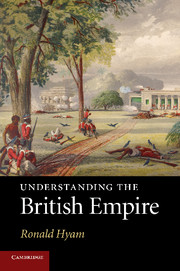Book contents
- Frontmatter
- Contents
- List of plates
- List of figures
- List of maps
- List of tables
- Preface
- Acknowledgements
- List of abbreviations
- Introduction: perspectives, policies, and people
- I Dynamics: geopolitics and economics
- 1 The primacy of geopolitics: the dynamics of British imperial policy, 1763–1963
- 2 The partition of Africa: geopolitical and internal perspectives
- 3 The empire in a comparative global context, 1815–1914
- 4 The myth of ‘gentlemanly capitalism’
- II Ethics and religion
- III Bureaucracy and policy-making
- IV Great men
- V Sexuality
- VI Imperial historians
- Published writings of RH on imperial history
- Index
4 - The myth of ‘gentlemanly capitalism’
Published online by Cambridge University Press: 05 August 2012
- Frontmatter
- Contents
- List of plates
- List of figures
- List of maps
- List of tables
- Preface
- Acknowledgements
- List of abbreviations
- Introduction: perspectives, policies, and people
- I Dynamics: geopolitics and economics
- 1 The primacy of geopolitics: the dynamics of British imperial policy, 1763–1963
- 2 The partition of Africa: geopolitical and internal perspectives
- 3 The empire in a comparative global context, 1815–1914
- 4 The myth of ‘gentlemanly capitalism’
- II Ethics and religion
- III Bureaucracy and policy-making
- IV Great men
- V Sexuality
- VI Imperial historians
- Published writings of RH on imperial history
- Index
Summary
[Not previously published, this chapter does not seek rigorously to review a debate which has become controversial and even heated; rather it tries to show that economic history cannot be treated separately from political and diplomatic history if a comprehensive picture is the aim. This conclusion could perhaps be an enduring legacy of the debate, even when interest refocuses elsewhere. (New directions are strikingly suggested by Professor Hopkins himself, into globalisation and empires as transnational organisations with supranational connections: A.G. Hopkins, ‘Back to the future: from national history to imperial history’, Past and Present, no. 164 (1999), pp. 198–243.)]
The City of London was at the centre of a commercial empire, remarkable in its global reach. Britain was the world's banker, and its mercantile marine and overseas investments were among its most significant ‘imperial’ attributes. This remarkable economic system is the subject of a comprehensive study by P.J. Cain and A.G. Hopkins. Now in its second edition, British imperialism, 1688–2000 is an impressively learned book of 739 pages, developed from an influential pair of articles in the Economic History Review, entitled ‘Gentlemanly capitalism and British overseas expansion’, published in 1986 and 1987. In British imperialism, the authors propose a large-scale simplification and hold a strong interpretative line through a long period of time (although 1688 to 1850 is dealt with in a forty-page ‘prospective’).
- Type
- Chapter
- Information
- Understanding the British Empire , pp. 133 - 152Publisher: Cambridge University PressPrint publication year: 2010



